You can feed your chickens almost anything, which is one of the best things about having them in your backyard. I love giving chickens table scraps that my dogs won’t eat. It’s a waste to throw away food, so it’s good to know that chickens will eat some scraps that people would normally throw away.
But not everything is safe to give to your chickens. In fact, some foods that you might think are safe for chickens are in fact, quite the opposite. Some food scraps are dangerous (even deadly) to give to chickens. Read on to learn more about some common food scraps that you shouldn’t feed your chickens.
Dried beans like black beans, kidney beans, pinto beans, and other varieties are a staple in many kitchens. Their affordability, long shelf life, and nutritional value make them an ideal pantry staple. But what about feeding dried beans to backyard chickens? Can chickens eat beans that have not been prepared in any way?
The answer is complex because while beans offer some nutritional benefits, they also pose significant dangers if fed incorrectly. Raw and uncooked beans contain high levels of lectins—natural toxins that protect the plant but can be harmful if consumed.
This article provides a comprehensive look at the pros and cons of feeding dried beans to chickens. We’ll discuss proper preparation methods, alternatives to feed instead, and what beans are safest if you do choose to feed them.
The Potential Dangers of Uncooked Beans
Raw or improperly cooked beans are highly dangerous for chickens and should be avoided. The risks include:
-
Phytohemagglutinin – Also called kidney bean lectin or PHA this is a type of lectin found at high levels in undercooked kidney beans. Extremely toxic, it can cause vomiting diarrhea, and even death in chickens. Just a few raw beans can be fatal.
-
Other toxic lectins – All beans contain lectins to some degree. While less toxic than PHA in kidney beans, improperly prepared beans still pose a risk of making chickens ill.
-
Digestive upset – Raw beans are difficult for chickens to digest properly and may lead to upset stomach, gas, diarrhea, and nutritional deficiencies.
-
Bean sprouts – Allowing chickens to eat growing bean sprouts is also hazardous as lectins remain present. Only feed sprouted beans once fully mature.
The takeaway is that dried beans must always be thoroughly cooked by boiling both before and after soaking to fully deactivate lectins and make them safe for chicken consumption.
So while dried beans hold nutritional value, it takes proper preparation to unlock that benefit and avoid potentially deadly consequences.
Potential Health Benefits of Well-Cooked Beans
When dried beans are soaked, boiled, and cooked through multiple times, the lectins are neutralized. Properly prepared beans can then provide the following nutritional benefits:
-
Protein – Beans offer a substantial amount of plant-based protein, important for egg production, muscle maintenance, and feather growth.
-
Fiber – The fiber in cooked beans supports good digestion and gut health. It may also help minimize feather pecking behavior.
-
Iron – Beans contain iron to support healthy red blood cell formation and prevent anemia
-
Other vitamins/minerals – Beans provide B vitamins, potassium, magnesium, calcium and more to support overall health and development.
In moderation, well-cooked beans make a fine supplemental treat for backyard chickens. Just be sure to fully cook any beans according to tested recipes before feeding.
Safe Preparation Methods for Feeding Beans
To safely feed dried beans to chickens:
-
Pick through beans and discard any shriveled, discolored, or split beans which are more likely to contain concentrated lectins.
-
Soak beans for 8-12 hours, drain, add fresh water, and boil vigorously for at least 10 minutes.
-
Drain beans again, rinse, add fresh water, then simmer for 45 minutes to 1 hour until very soft throughout. Stir periodically.
-
Allow beans to cool fully before feeding to avoid crop burns. Only feed cooked bean pieces, never whole beans.
-
Limit bean treats to no more than 2-3 times per week, and just a few spoonfuls per chicken.
-
Store any leftover cooked beans in the refrigerator for no more than 5 days. Reheat before re-feeding.
With multiple cycles of soaking, boiling, and simmering, the beans become safe, digestible, and release their beneficial nutrients. It’s a time investment but worth it to safely unlock their protein content.
Best Types of Beans for Chickens
While all beans require diligent cooking, some bean varieties are safer than others:
-
Navy beans – Very low in lectins compared to other beans. A reasonable choice if properly prepared.
-
Small red beans – Another fairly low lectin option that can be fed in moderation when thoroughly cooked.
-
Chickpeas/garbanzos – Also low in lectins and a good source of protein and fiber. Precook well.
-
Soybeans – An outstanding source of protein but only feed cooked, such as edamame. High in fat so limit amounts.
-
Green beans – Fresh or frozen green beans only need light cooking and provide vitamins A, C, K.
Avoid kidney beans at all costs – these contain the highest lectin levels and pose the greatest risk even with cooking due to lingering toxins. Also limit broad beans and lima beans as they tend to be higher in lectins. When in doubt, steer clear of that bean variety for your flock.
Healthy Alternatives to Feeding Beans
If you decide the risks outweigh the benefits, there are lots of other nutritious foods to offer your chickens instead:
-
Cooked lentils or split peas for plant protein
-
Cooked brown rice, barley, quinoa, or whole oats for carbohydrates
-
Fresh greens like lettuce, spinach, kale, Swiss chard for nutrients
-
Chopped veggies – carrots, winter squash, sweet potatoes, beets
-
Fresh fruits like melon cubes, berries, apple slices
-
Sprouted seeds – wheat, sunflower, mixed sprouts
-
Dairy products like plain yogurt, soft cooked eggs, cottage cheese
With so many options, there are ample healthy treats to provide without ever feeding beans. Focus on variety and moderation.
To wrap up, feeding any raw or improperly cooked beans to backyard chickens poses a real risk of lectin toxicity. However, beans cooked thoroughly by a tested recipe can offer supplemental protein, fiber, iron and other benefits. Weigh the evidence carefully before deciding whether beans have a place in your flock’s diet. Then if you opt to feed them, stick to the safest bean varieties and prep methods to avoid disaster. As always, moderation is key. With hens, an ounce of prevention is truly worth a pound of cure.
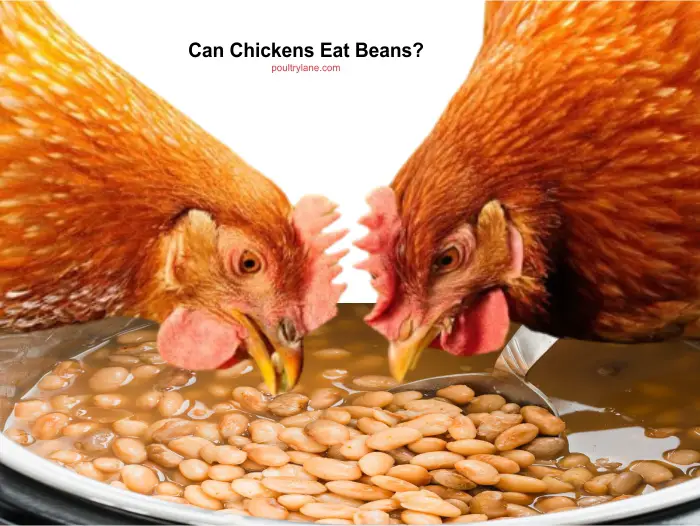
Anything Perceived To Be Unhealthy
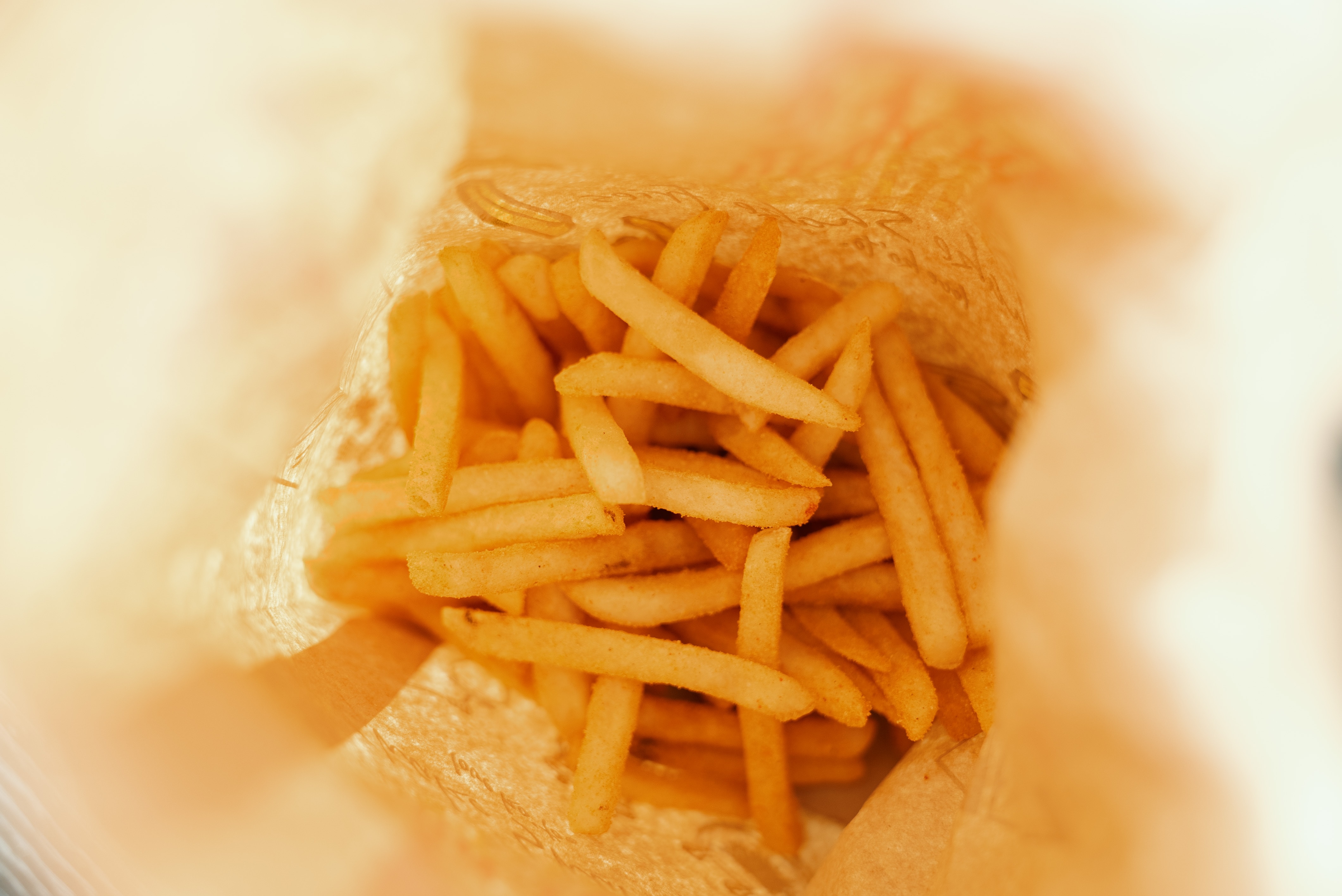
They shouldn’t eat anything that has been fried or is very salty or sweet. Excess fat, sodium, or sugar can make them sick. If it’s not good for you, it’s not good for your chickens either.
Dry Beans And Lentils
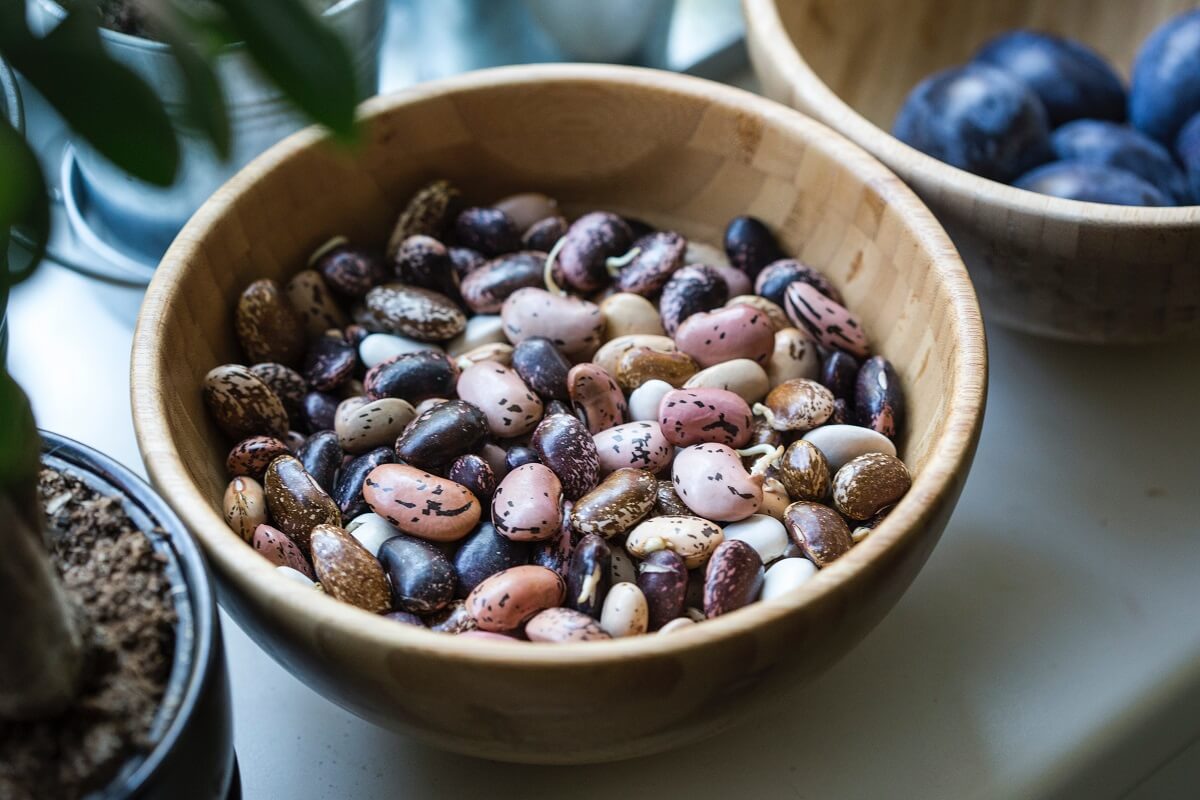
Most people wouldn’t throw out dried beans or lentils because they have a shelf life of almost forever. As you clean out your pantry, don’t give your chickens a bag of pinto beans that you’re only half way through and aren’t going to cook.
Uncooked beans and lentils contain a compound called phytohaemagglutinin. This compound is poison to chickens. Cook the beans to destroy the compound and then you can feed them to your flock. You can also sprout beans and lentils. Once sprouted, they are safe to feed.
If you feed your chicken’s cooked beans or lentils, make sure they are homemade. They don’t need the extra salt that beans from a can usually have, so don’t give them that.
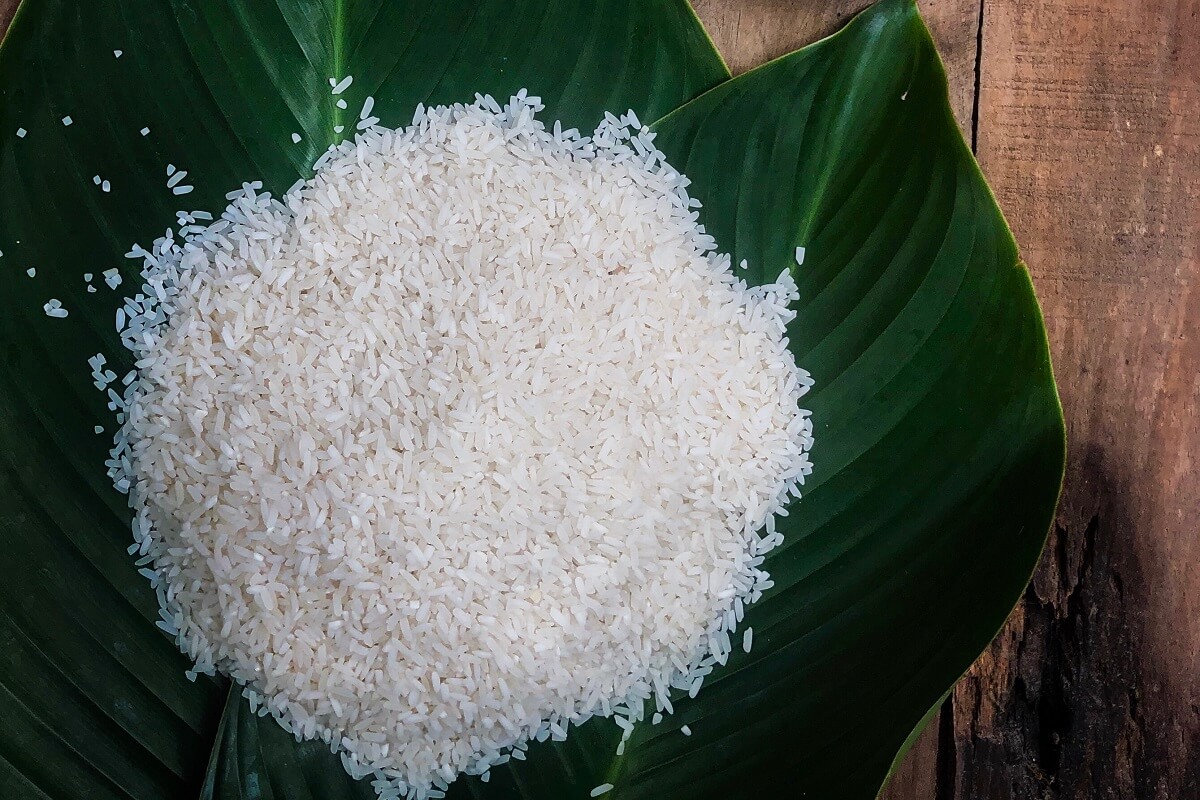
Many years ago, it was popular to throw rice at weddings. You’d get a little bag of rice and toss the rice at the couple after the ceremony. Birds were eating the rice, which was often very bad for them, so people switched to throwing birdseed instead.
Dried rice isn’t dangerous because of a chemical but because of the fact that it’s dried. When you cook rice, it swells. The rice does the same thing when you feed it to your chickens. It comes in contact with the moisture in the bird’s digestive tract and swells. When the rice expands, it can expand too much and cause harm to their gut.
Avoid this problem by cooking rice first. Chickens will go crazy over cooked rice. Don’t feed them dried.
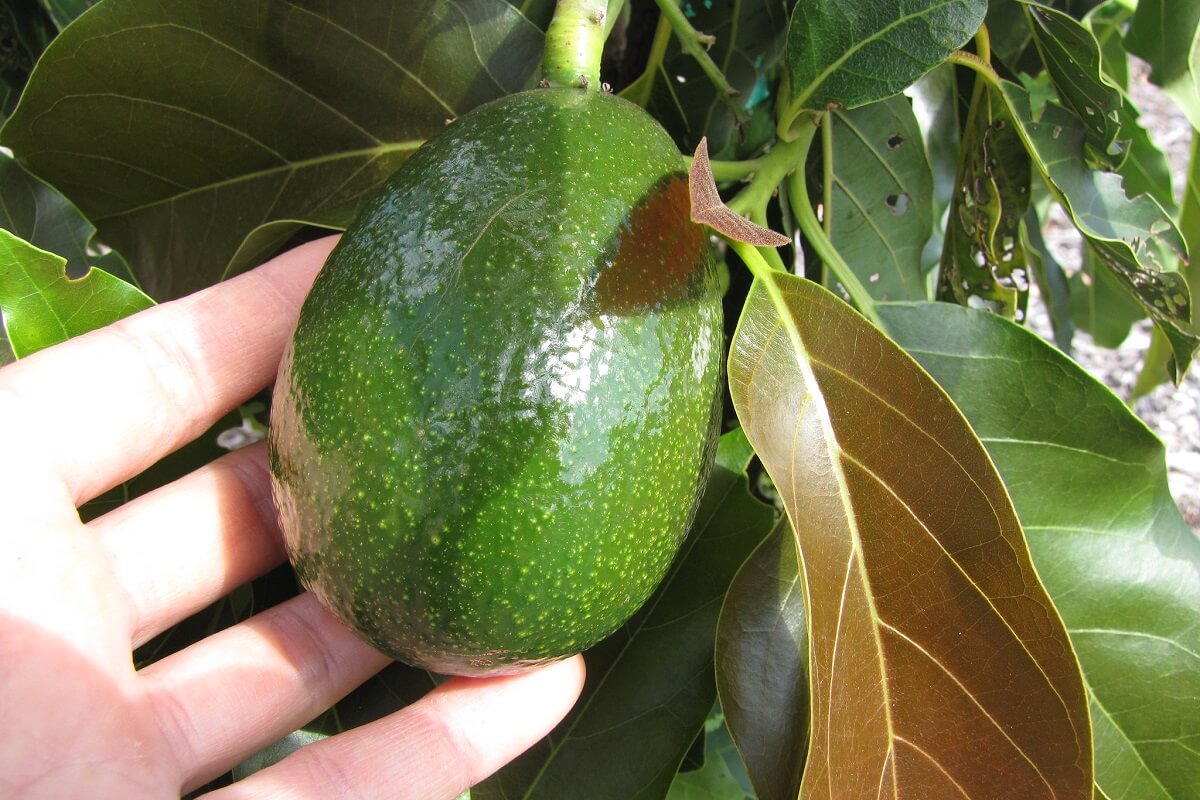
I’m a huge fan of avocado. It’s one of my favorite foods to eat fresh. In fact, at any given time, there are bound to be several avocados in our fridge. You don’t eat the skin or the pit of the avocado, and it becomes a food scrap.
The skin and pit of the avocado is not something that you want to feed your chickens. It contains a toxin called persin. Persin is dangerous to feed chickens and in large enough amounts, it can be deadly. The skin and pit have the largest concentrations of persin, but there is a small amount that is present in the flesh as well. Be on the safe side, and avoid giving your chickens any avocado.
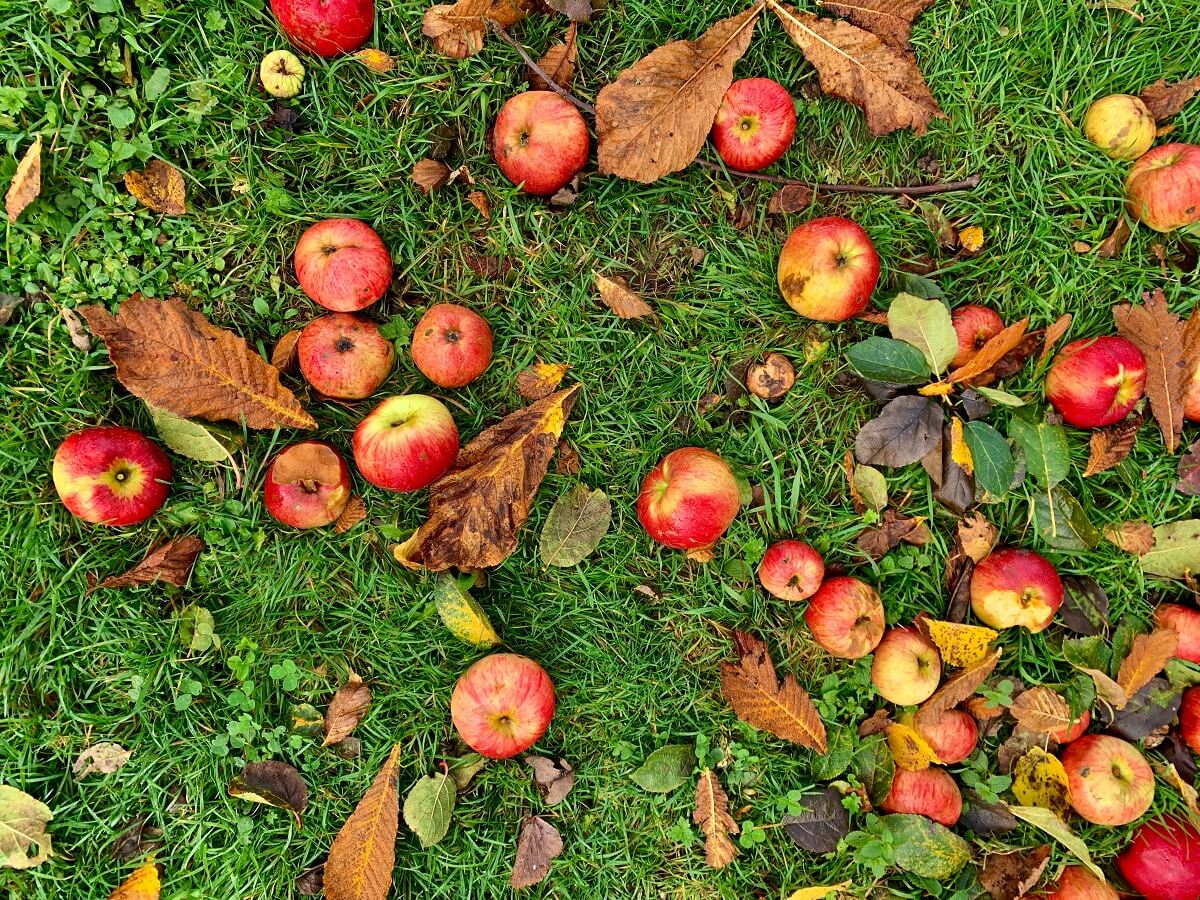
For the most part, chickens are smart about what they can and cannot eat. They tend to avoid foods that are bad for them and eat more of the foods that are good for them. If you have fruit trees, you’ll know that chickens are crazy about fruit that falls to the ground. If it’s soft enough, they’ll eat all of it. Apples, cherries, and other stone fruits that fall to the ground become fair game for chickens.
Related Post: How To Store Apples
Apples, cherries, and other stone fruits have seeds that contain cyanide. If your chickens eat small amounts of the seeds, they’ll probably be fine. The problem happens when they consume too many cyanide-containing seeds. Don’t spend hours trying to get all the seeds out of the apple cores, but be careful giving your chickens apples. Don’t let apples become the only part of their diet.
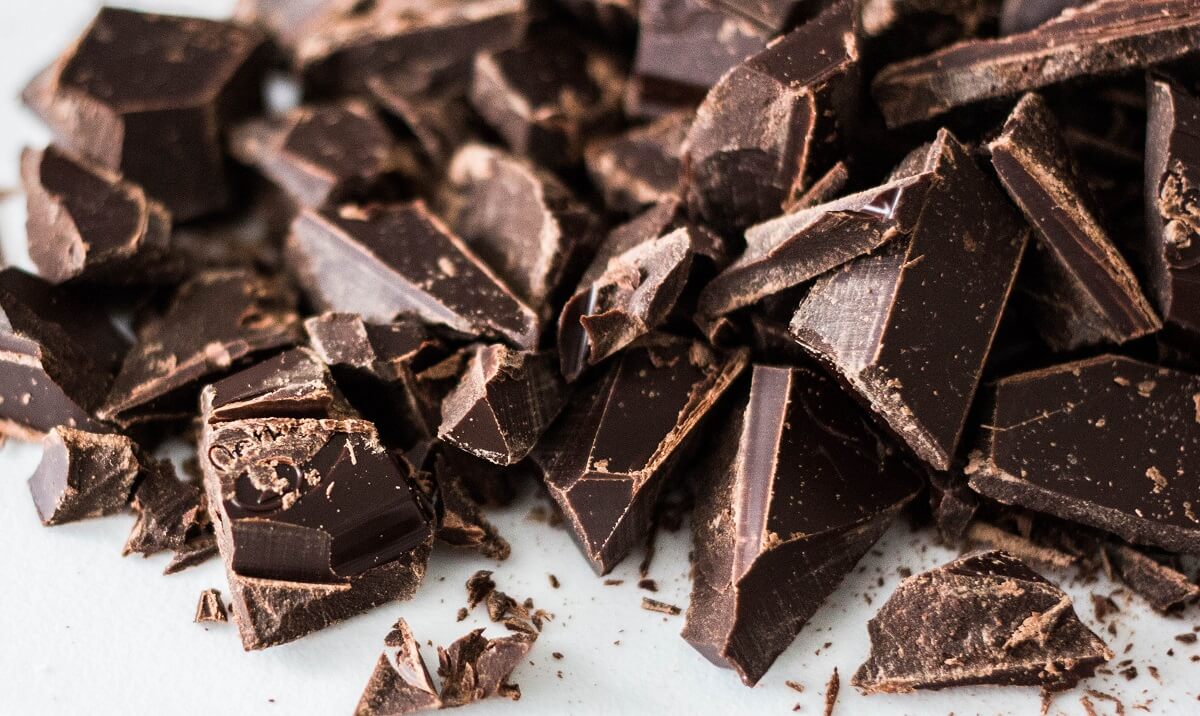
This shouldn’t need to be said because who doesn’t eat all of their chocolate? When did chocolate become trash? But if you don’t eat your chocolate, you should know that giving it to your chickens can be bad for them. It’s also dangerous to feed to dogs — in case you didn’t know.
Chocolate contains a toxic chemical called theobromine. Avoid the issue and just eat the chocolate yourself.
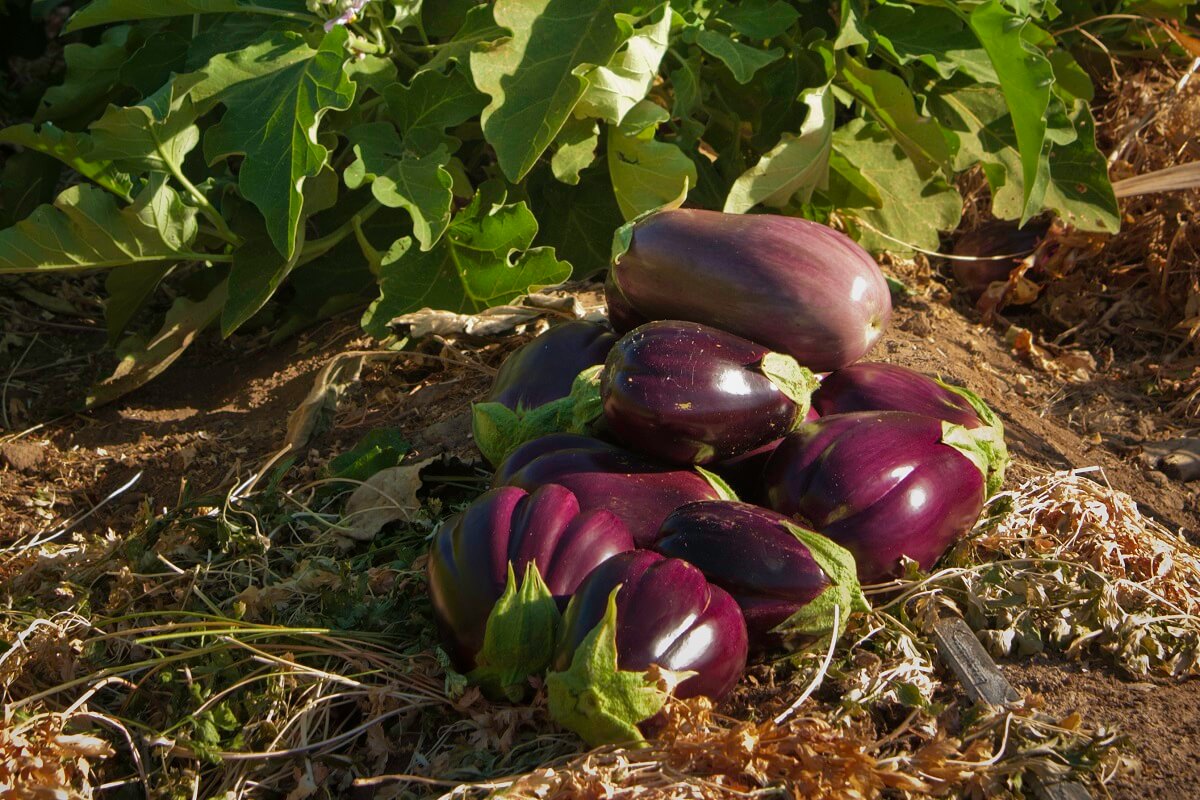
The nightshade family includes tomatoes and eggplants. These plants contain a toxic substance called solanine. Solanine is found in all parts of tomato and eggplant. The leaves, stems, and raw tomato and eggplant fruits contain solanine.
Do not give your chickens tomato or eggplant scraps. It may be tempting to throw plant parts into the coop for them to eat. Compost these scraps instead.
Kat Shereko / Insteading
Many homecooked meals that I prepare have chopped onion in them. I cut off the ends of the onion and don’t use them, and sometimes I only use part of the onion. But I never give the onion scraps to my chickens.
Onions contain a toxin called thiosulphate that destroys red blood cells in chickens. If enough red blood cells are destroyed, chickens can develop jaundice or anemia. Avoid this problem, and put your onion scraps into a compost pile instead.
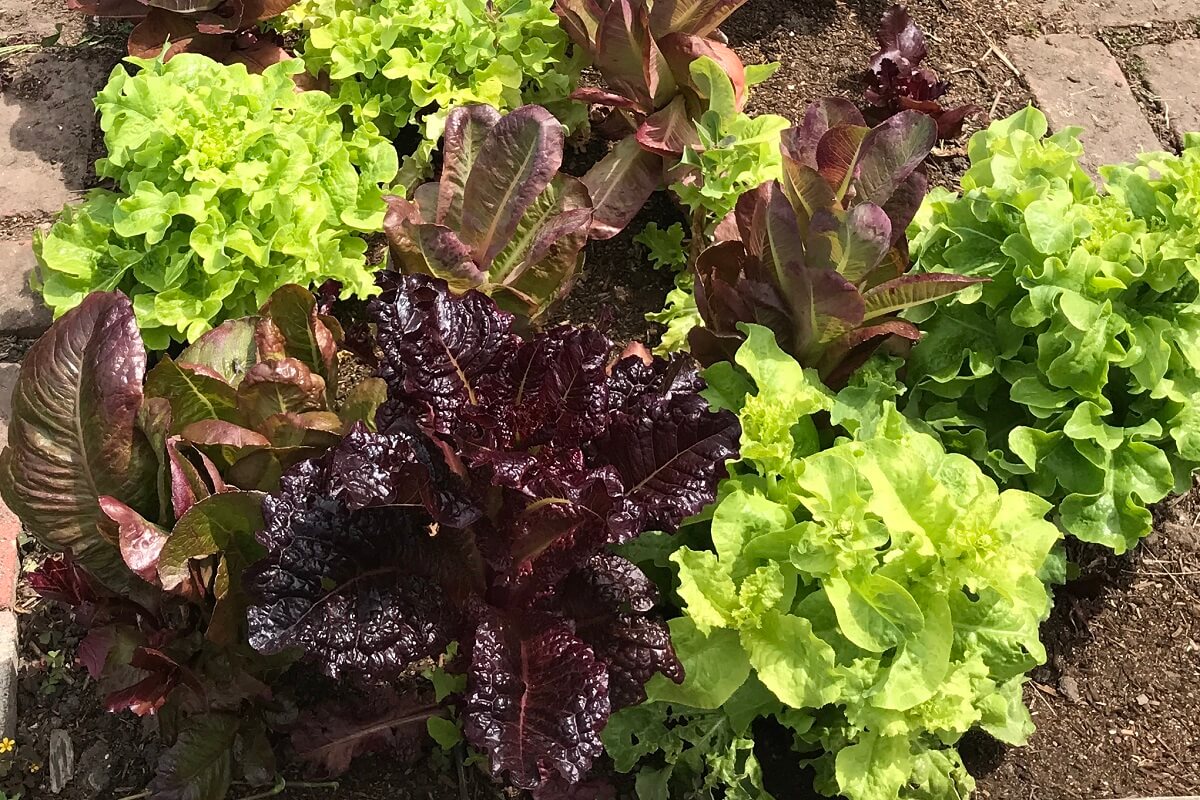
Wait, lettuce is bad for chickens? I thought it was healthy. I’ve heard these questions before, so please bear with me. Part of the reason lettuce is so healthy for humans is it’s a low calorie-dense food. Lettuce contains a large amount of water.
Related Post: How To Grow Lettuce Indoors
Chickens will go crazy over lettuce and eat a ton of it. If your chickens eat a lot of lettuce, they will also drink a lot of water. This can make them have diarrhea. You can give them small amounts of lettuce, but keep in mind that too much may make their stomachs upset. Also, the type of lettuce makes a difference in the amount of water it holds. Iceberg lettuce is full of water while some other types, like buttercrunch lettuce, don’t have as much.
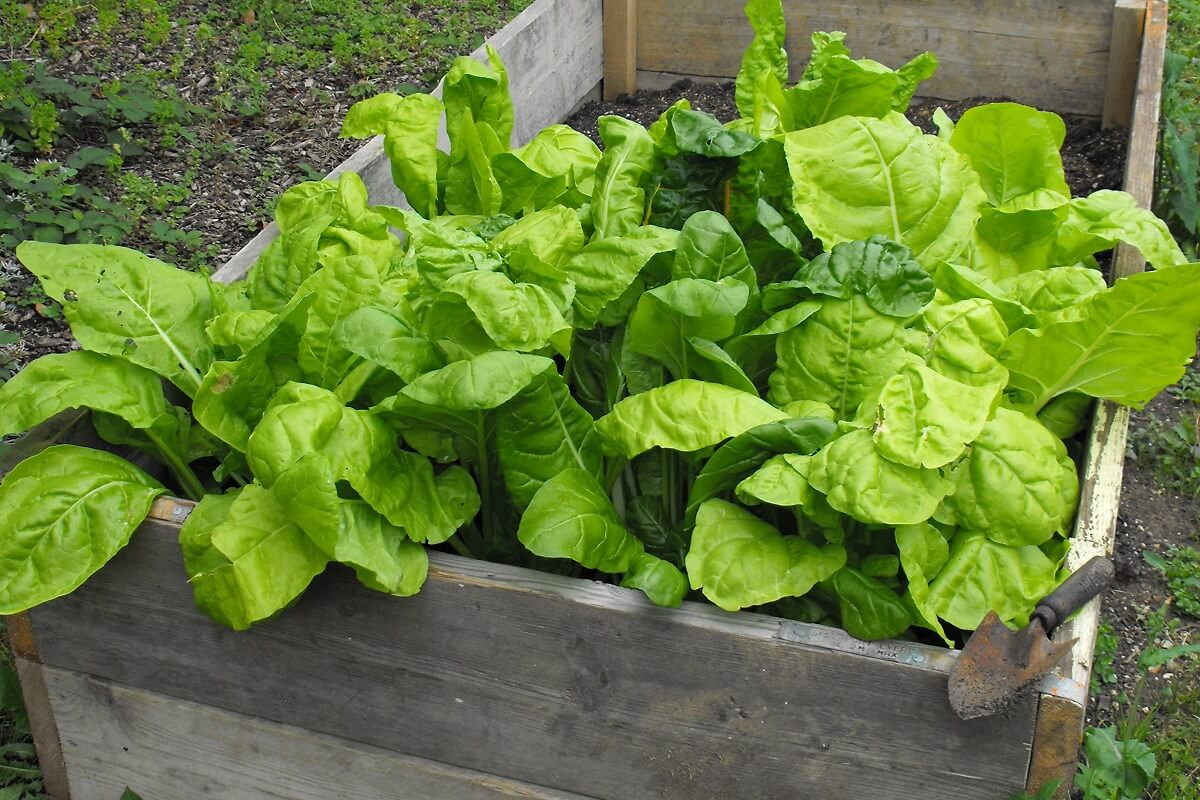
This is another vegetable that, although it is super healthy, can be dangerous to feed to your chickens. The water content of spinach isn’t as high as that of lettuce, so your chickens won’t get diarrhea if they eat too much.
Eating too much spinach can prevent proper calcium absorption. Spinach contains large amounts of vitamins and minerals which is always a good thing, but if your chickens eat too much spinach, they will absorb only nutrients from the spinach. One nutrient not found in spinach in large amounts is calcium. While a chicken’s body is busy absorbing nutrients from spinach, it’s unable to absorb calcium.
Play it safe and don’t give chickens spinach. Feed them kale, cabbage, or collard greens instead.
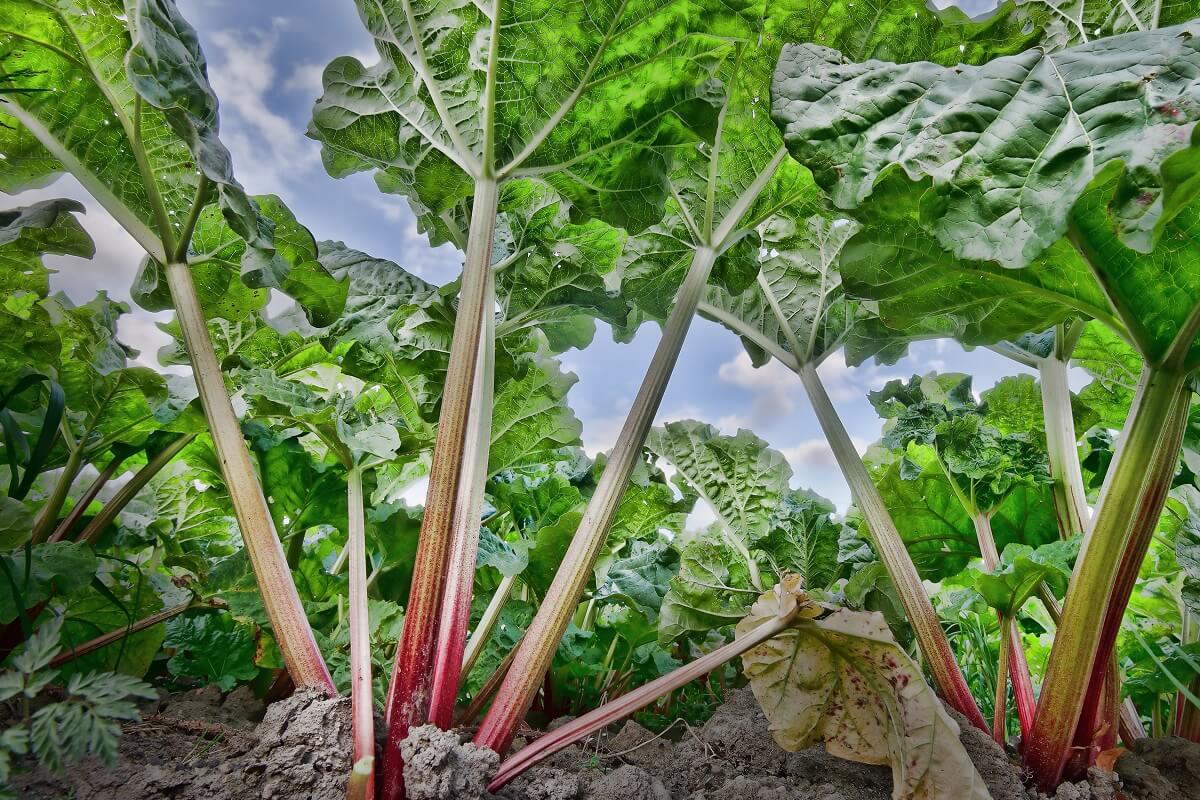
Did you know that if rhubarb isn’t cooked properly it can be dangerous for you to eat? It’s true! The leaves and stems of the rhubarb plant contain oxalic acid which can be toxic to you and your chickens (spinach also contains small amounts of oxalic acid). Put rhubarb scraps in the compost bin to be safe.

Many of the flowers you plant around the yard or in containers can be dangerous for your chickens. If your chickens are free range, they probably won’t bother them. If you put these plants next to the coop and your chickens can’t get out, they might be tempted to eat them, so stay away from foxgloves, lobelia, mushrooms, oak leaves and acorns, holly, lupine, and ferns.
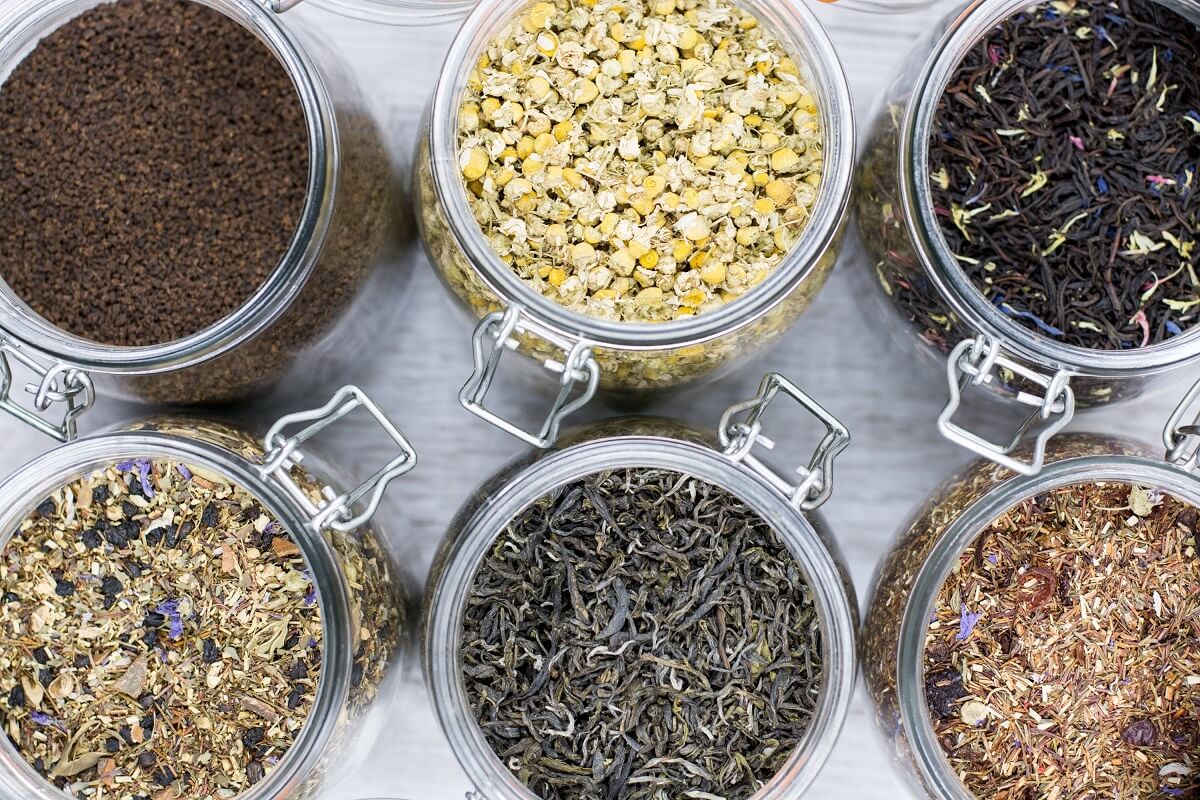
There is some debate about feeding coffee and tea to chickens. I’ve never fed either to mine because it’s valuable in compost piles. However, some people claim their chickens really like coffee grounds and tea leaves.
Coffee and tea both contain caffeine which is a methylxanthine. In large enough amounts, it can lead to heart problems. Avoid giving it to your chickens by tossing coffee grounds and tea leaves on your compost pile.
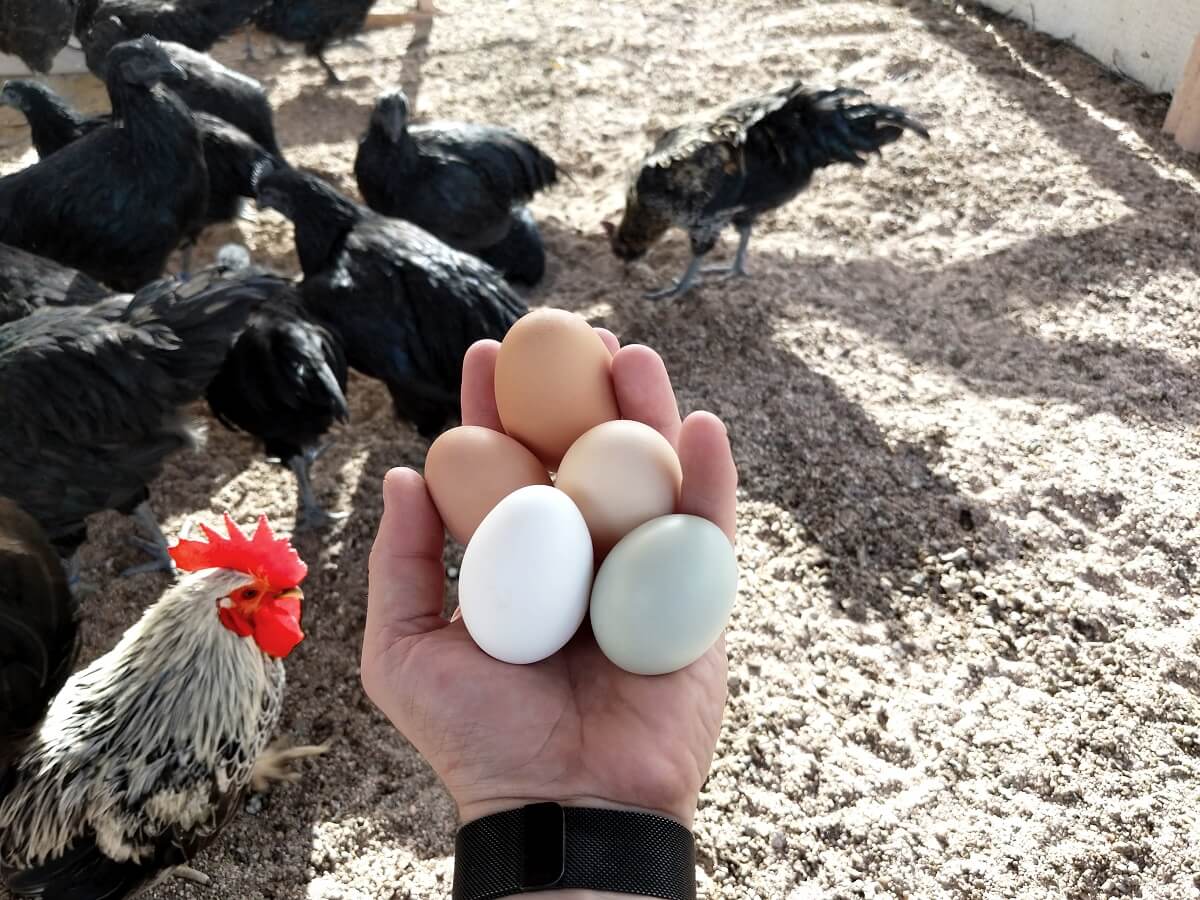
Are raw eggs dangerous to chickens? No. Will they give hens the habit of egg-eating? Potentially.
Chickens can develop a liking for raw eggs. If that happens, you’ll have a hen that will raid your nesting boxes looking for more. It’s difficult to fix an egg-eater, and much easier to prevent it from happening. If you have extra eggs that aren’t going to be used, cook them before feeding to your chickens. They won’t associate cooked eggs with the eggs they lay, and you’ll be safe.
What Kitchen Scraps Your Chickens Can And CANT Eat! Some Are Toxic For Chickens!
FAQ
Can birds eat dried beans?
How long to soak beans for chickens?
What dry grains can chickens eat?
Can chickens eat dry beans?
Even though dry beans are laden with nutrients, it is not advisable to feed them to your chickens without cooking. The main reason why you shouldn’t do that is that dry beans may kill your bird after eating them. Your chickens can eat beans. Cook the beans well before allowing your chickens to feast on them.
Can one eat chicken while on a diet?
If it’s not a vegetarian, vegan diet, with restrictions on animal protein, more specifically chicken, it’s okay to eat chicken. It is recommended to consume preferably organic chicken and to have healthy habits and lifestyle.
Can chickens eat cooked beans?
Yes, chickens can eat baked beans. While cooked beans are safe for chickens, uncooked beans contain lectins that are toxic to chickens. Never feed uncooked beans to chickens. Source Yes, chickens can eat cooked black eyed peas. While cooked beans are safe for chickens, uncooked beans contain lectins which are toxic to chickens.
Can chickens eat refried beans?
It is certainly safe to give refried beans to your chickens but bear in mind that these will contain a high amount of fat because of the way that they’ve been cooked. Too much fat can cause digestive problems in your hens. Therefore, these should only be fed in extreme moderation and only as a very occasional treat.
